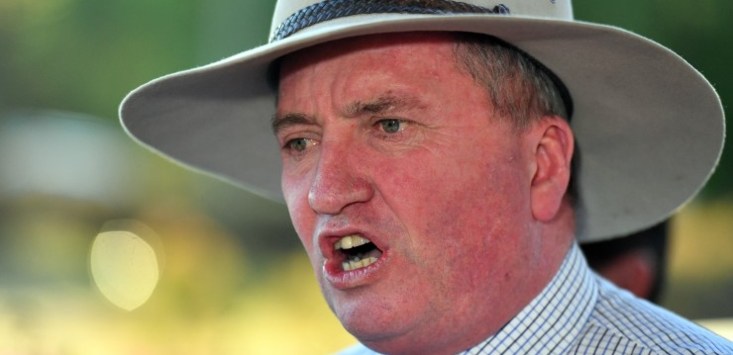
Former Nationals' leader Barnaby Joyce. Source: AAP/Mick Tsikas.
Former Coalition deputy prime minister Barnaby Joyce has pointed the finger towards Labor and AGL Energy for the collapse of recycling giant REDcycle, while the Greens are blaming the Coalition and Labor rounded on major supermarkets Coles and Woolworths to solve the problem.
On breakfast television this morning, Joyce was asked about why Australians had only recycled 16% of all plastic in the past four years during his government, to which the former Nationals leader groaned.
“We’ve solved global warming, we’ve solved the drought, we’ve obviously fixed that problem,” Joyce said sarcastically, holding an umbrella to shield himself from the heavy rainfall impacting several states.
Joyce continued that the decline of recycling was linked to a renewed push to decarbonise Australia, including the Albanese government’s reticence to heed calls from Opposition Leader Peter Dutton to investigate nuclear energy.
It also comes amid Atlassian billionaire and largest shareholder Mike Cannon-Brookes’ efforts to speed up AGL’s closure of coal-powered plants which account for 8% of Australia’s total carbon emissions, making the energy giant the country’s biggest emitter.
Cannon-Brookes will head into tomorrow’s annual meeting with AGL shareholders with a spring in his step as his four director picks — including energy regulator Kerry Schott, former Tesla executive Mark Twidell and CSR director Christine Holman — are poised to join the AGL board.
But the former Nationals leader reckons a swift coal exit comes at a cost. Joyce continued that “one of the things about it, of course, is [that it] costs money to recycle. Like all manufacturing … requires energy, requires power”.
“If we keep devoiding our nation of the capacity to produce baseload power, shutting down coal-fired power stations, not wanting to talk about nuclear power … then you’re not going to have manufacturing and that means you’re not gonna have recycling.
“You just gotta be a realist. Gotta get cheaper energy.”
It comes as Australia’s largest recycling scheme sensationally collapsed last Tuesday after three companies that recycle plastic for REDcycle — Plastic Forests, Replas, and Close the Loop — ran into trouble.
Partners have “temporarily stopped accepting and processing soft plastics” due to “unforeseen challenges exacerbated by the pandemic”, REDcycle said in a statement on Wednesday.
A fire at one processing partner also halted its ability to process soft plastics, it added.
The scheme had claimed to be collecting 5 million plastic bags, pet food bags, ice cream wrappers, bubble wrap and frozen food packaging a day from 2000 supermarkets across Australia.
Woolworths apologised to customers on Tuesday, but Coles declined to comment about when it became aware of allegations REDcycle was stockpiling hundreds of millions of plastic bags in warehouses.
REDcycle would not confirm how much plastic is currently stockpiled.
In the wake of the collapse, Environment Minister Tanya Plibersek rounded on the major supermarket duopoly in calling for them to “do the right thing” in solving the recycling problem.
“It shouldn’t be beyond these big supermarkets to come up with a viable solution to allow Australians to continue to recycle,” Plibersek said on Wednesday.
“I expect Coles and Woolworths to step up and indicate how they will deal with soft plastic recycling. We’re happy to work with them to achieve this.”
This morning, Plibersek responded to Joyce’s comments by saying Australia needs to instead “rebuild and build new recycling facilities” to fill the gap that REDcycle’s collapse had left.
Greens spokesperson for waste and recycling, Senator Peter Whish-Wilson, says he’s disappointed with Plibersek’s response and argued the government shouldn’t “wipe its hands clean of responsibility”.
“The attitude and culture of governments leaving this problem to big business to sort out is why we’re in this mess,” Whish-Wilson said.
“Big businesses have no incentive to fix the problem, they’re only interested in their bottom line.”
Whish-Wilson suggested mandatory national packaging targets, which would embolden the government to “invest in the infrastructure and technology necessary to recycle things like soft plastics right across the country”.
He says an export ban on sending plastic overseas was good, but without domestic self-sufficiency in place to process plastics, “our environment suffers”.
Plus, Whish-Wilson adds, “Australians miss out on thousands of job opportunities that could be created in a true circular economy”.
Handpicked for you

From Target to Sheike: Australia’s most and least ethical fashion brands, ranked



COMMENTS
SmartCompany is committed to hosting lively discussions. Help us keep the conversation useful, interesting and welcoming. We aim to publish comments quickly in the interest of promoting robust conversation, but we’re a small team and we deploy filters to protect against legal risk. Occasionally your comment may be held up while it is being reviewed, but we’re working as fast as we can to keep the conversation rolling.
The SmartCompany comment section is members-only content. Please subscribe to leave a comment.
The SmartCompany comment section is members-only content. Please login to leave a comment.